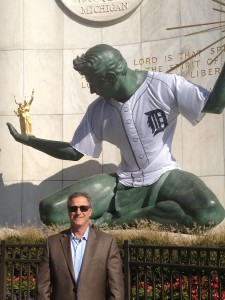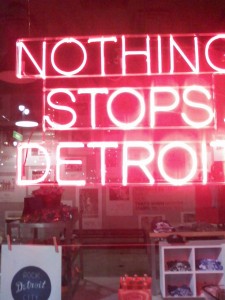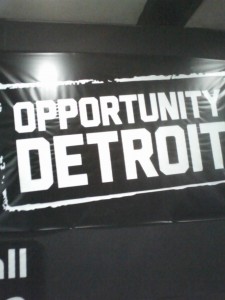Detroit was where it was at for me
My brother Jim with the “Spirit of Detroit” in 2012, the last time the Tigers made it to the World Series.
“This is the town, this is where I want to be/This is my town, Detroit is where it’s at for me.” Song in Altes Beer commercial, WJR 760.
“It’s carbon and monoxide/The ole Detroit perfume/It hangs on the highways in the morning/And it lays you down by noon…Detroit, Detroit/Got a hell of a hockey team/Got a left-handed way of making a man sign up on that automotive dream…” Paul Simon, Papa Hobo
So here I come, late as usual, weighing in with 1200 more on my hometown. Growing up, one thing I hated about Detroit were the suburbs just north of 8 Mile Road. 8 Mile Road was the border; we lived between 6 and 7, and one thing I loved was that my parents refused to move out, like everyone else white did after the riots in ’67. Split to Oak Park or Southfield, Birmingham, Farmington, or all the way to Bloomfield Hills. “White flight,” it was called, one of the reasons Detroit’s population dropped from near 2 mill to 740 thousand.
Dulcie and Norman Rosenfeld believed in Detroit. So why wouldn’t their oldest son, who got to think he was urban tough. And cool — I had a black blood brother, Mark Williams. (Well, he slashed his finger with the razor blade — I was too chicken.) Cool to be one of the four white kids in the 6th grade class at MacDowell Elementary. Cool to work summers on Livernois, the “Avenue of Fashion,” with black co-workers. I’d wanted to be black since I was 10, listening to my sisters’ Motown 45s and twirling on my stool in Milton’s Drugs or Share (“Share treats you Fair:) Drugs, eating pork rinds and chocolate Cokes. The more I played black friends like Gregory Freeman, Greta Sears, Frank Duncan and Saturnius Tackett (greatest schoomate name in Hampton Junior High history; well, circa 1968 anyway), the more I resented those kids gone forever on the other side of Detroit’s wide Outer Drive, living in flat, mall-to-mall subdivision sectors of Burger Kings and what I assumed was boredom. I’d see them on Sundays for Sunday School at Temple Israel, the synagogue four-blocks from our house; so Reform, we’d drive there on the Sabbath.
I thought white suburbanites used Detroit. But didn’t give anything back. As a kid I resented how they drove down to see ballgames at Tiger Stadium, or to see the Pistons at Cobo Hall and Red Wings at the Olympia on Grand River. Plays at the Fisher on West Grand Boulevard, concerts at Ford Auditorium on Jefferson. (Did they even know you had to go south to get to Canada? Google Map it!)
The point is: I just got back from a Michigan visit to the suburbs back there where my relatives live now, and guess what? I found the place practically idyllic, in its lush green hills, two-lane blacktop curves that lead to black water lakes in places like Wing Lake, Cass Lake, Walled Lake, Keego Harbor. What’s better than a home on a lake? In the summer? Michigan is where it’s at, along with a jillion May fly/June bug splatters on the windshield, until firefly July. But to drive through the deeply-shaded neighborhoods of Huntington Woods and Grosse Pointe Farms/Grosse Pointe Woods/Grosse Pointe Shores with my friend Byron, to a fish hut on gleaming blue-green Lake St. Clair — well, wow. It may not be a Great Lake, but like them big enough so you can’t see to the other side, which is Ontario. Stand here and begin to appreciate summer thunderstorms and humidity — forget about buying my way into one of these mansions of glory.
A suburb called East Detroit (I drove an ice cream truck there one summer), changed its name to “Eastpointe” in an effort to come off less Detroity, real estate-wise And how did that work out for them? According to a real estate website, Eastpointe home prices have dropped by almost one-half between the turn of the millennium and today, from a median of just under $100,000 to $50,000.
At the age of 17 I was lucky to land an internship at WJR 760, the clear channel AM radio station known across the state as, “The Great Voice of the Great Lakes.” WJR had offices in “the Golden Tower of the Fisher Building,” next to GM Headquarter in what was known as the New Center of Detroit. Now they call it Midtown. (“New Detroit” was the name of the organization formed after the 1967 riots. Here’s an idea: New New Detroit. Including the suburbs.)
On this trip back I met with Elaine Stritch, the 88-year-old Broadway diva. She’d just moved from NYC back to her hometown and was looking forward to being around her local nieces and nephews. She was also excited about Shoot Me, the new documentary (2013) about her, premiering that weekewnd at Michael Moore’s film festival in Traverse City. When I offered to drive Ms. Stritch “up north” for the screening, she said, “I’m quite sure Mr. Moore will be sending a car.” A friend of her caregiver had set up our meeting because she thought I could help Elaine Stritch with her memoir, but it never happened, and then she died the next summer. (She did say she had a title for it: How Drinking Saved My Life) Well, at there’s one woman who could go home again…
I find a lot of hope for my hometown in these words from the late activist Grace Lee Boggs: “One of the things that I learned from my father is that a crisis is both a danger and an opportunity. That’s in the Chinese characters. And how you take advantage of the opportunity of the crisis rather than become despairing because of the danger and fearful is something we’re facing all the time, particularly at this time. And it’s a philosophical approach I think that is very much needed and also alive here in the city of Detroit.”
I remember a poem that summed it all up for me as it blew my mind: From the Op-Ed Page of the New York Times in 1990:
Poem with one Fact, by Donald Hall
At pet stores in Detroit, you can buy
frozen rats
for seventy-five cents apiece, to feed
your pet boa constrictor
back home in Grosse Pointe,
or in Grosse Pointe Park,
while the free nation of rats
in Detroit emerges
from alleys behind pet shops, from cellars
and junked cars, and gathers
to flow at twilight
like a river the color of pavement,
and crawls over bedrooms and groceries
and through broken
school windows to eat the crayon
from drawings of rats—
and no one in Detroit understands
how rats are delicious in Dearborn.
If only we could communicate, if only
the boa constrictors of Southfield
would slither down I-94,
turn north on the Lodge Expressway,
and head for Eighth Street, to eat
out for a change. Instead, tomorrow,
a man from Birmingham enters
a pet shop in Detroit
to buy a frozen German shepherd
for six dollars and fifty cents
to feed his pet cheetah,
guarding the compound at home.
Oh, they arrive all day, in their
locked cars, buying
schoolyards, bridges, buses,
churches, and Ethnic Festivals;
they buy a frozen Texaco station
for eighty-four dollars and fifty cents
to feed to an imported London taxi
in Huntington Woods;
they buy Tiger Stadium,
frozen, to feed to the Little League
in Grosse Ile.
They bring everything
home, frozen solid
as pig iron, to the six-car garages
of Harper Woods, Grosse Pointe Woods,
Farmington, Grosse Pointe
Farms, Troy, and Grosse Arbor—
and they ingest
everything, and fall asleep, and lie
coiled in the sun, while the city
thaws in the stomach and slides
to the small intestine, where enzymes
break down molecules of protein
to amino acids, which enter
the cold bloodstream.
(For a version of this blog item on KPCC) http://www.scpr.org/blogs/offramp/2013/07/23/14333/another-native-son-explains-the-real-detroit/
Banner downtown, August 2013






2 Comments to “Detroit was where it was at for me”
Dennis said...
Lyrics to the Altes commercial:
“This is the town;
This is where I want to be.
This is MY town;
Detroit is where it’s at for me.
Laughing and drinking Altes Beer;
Listening to voices I want to hear.”
I’d love to see this ad again if you ever come across a copy.
admin said...
thanks for the correction on that D-man! I’ve looked online for an actual TV ad, but cannot find one darnit…Yet!